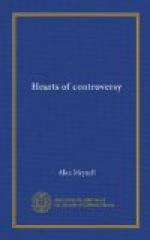fiction cannot exist without some such paradox.
Without it, where would our laugh be in response to
the generous genius which gives us Mr. Pecksniff’s
parenthesis to the mention of sirens ("Pagan, I regret
to say"); and the scene in which Mr. Pecksniff, after
a stormy domestic scene within, goes as it were accidentally
to the door to admit the rich kinsman he wishes to
propitiate? “Then Mr. Pecksniff, gently
warbling a rustic stave, put on his garden hat, seized
a spade, and opened the street door, as if he thought
he had, from his vineyard, heard a modest rap, but
was not quite certain.” The visitor had
thundered at the door while outcries of family strife
had been rising in the house. “’It is
an ancient pursuit, gardening. Primitive, my
dear sir; for, if I am not mistaken, Adam was the
first of the calling. My Eve, I grieve to say,
is no more, sir; but’ (and here he pointed to
his spade, and shook his head, as if he were not cheerful
without an effort) ‘but I do a little bit of
Adam still.’ He had by this time got them
into the best parlour, where the portrait by Spiller
and the bust by Spoker were.” And again,
Mr. Pecksniff, hospitable at the supper table:
“‘This,’ he said, in allusion to
the party, not the wine, ’is a Mingling that
repays one for much disappointment and vexation.
Let us be merry.’ Here he took a captain’s
biscuit. ’It is a poor heart that never
rejoices; and our hearts are not poor. No!’
With such stimulants to merriment did he beguile
the time and do the honours of the table.”
Moreover it is a mournful thing and an inexplicable,
that a man should be as mad as Mr. Dick. None
the less is it a happy thing for any reader to watch
Mr. Dick while David explains his difficulty to Traddles.
Mr. Dick was to be employed in copying, but King
Charles the First could not be kept out of the manuscripts;
“Mr. Dick in the meantime looking very deferentially
and seriously at Traddles, and sucking his thumb.”
And the amours of the gentleman in gaiters who threw
the vegetable-marrows over the garden wall.
Mr. F.’s aunt, again! And Augustus Moddle,
our own Moddle, whom a great French critic most justly
and accurately brooded over. “Augustus,
the gloomy maniac,” says Taine, “makes
us shudder.” A good medical diagnosis.
Long live the logical French intellect!
Truly, Humour talks in his own language, nay, his
own dialect, whereas Passion and Pity speak the universal
tongue.
It is strange—it seems to me deplorable—that
Dickens himself was not content to leave his wonderful
hypocrite—one who should stand imperishable
in comedy—in the two dimensions of his own
admirable art. After he had enjoyed his own Pecksniff,
tasting him with the “strenuous tongue”
of Keats’s voluptuary bursting “joy’s
grapes against his palate fine,” Dickens most
unfairly gives himself the other and incompatible joy
of grasping his Pecksniff in the third dimension, seizes
him “in the round,” horsewhips him out
of all keeping, and finally kicks him out of a splendid
art of fiction into a sorry art of “poetical
justice,” a Pecksniff not only defeated but
undone.




